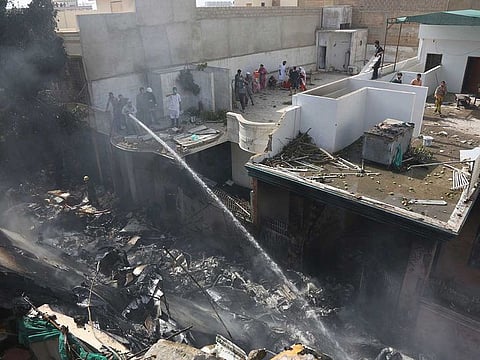PIA plane crash: Pilots were discussing coronavirus and lacked focus
Aviation minister says pilots were overconfident and not focused on their job

Dubai: Pilots of the PIA plane that crashed on May 22 in Karachi were not ‘focused’ as they discussed coronavirus and its impact on their families for at least half an hour before the crash.
Overconfidence and lack of concentration by pilots during the flight led to the fatal plane crash, revealed the provisional inquiry report presented in the National Assembly (lower house of the parliament) on Wednesday by Pakistan’s Aviation Minister Ghulam Sarwar.
Crashed short of runway
The PIA flight PK-8303 carrying 99 passengers crashed in a residential area in Karachi on May 22, short of the runway on its second attempt to land. The fatal accident cost 97 lives; two passengers miraculously survived.
Presenting the report, the Aviation Minister accused the pilot and the co-pilot of being ‘overconfident’. Based on the initial report, Khan held the pilot, the cabin crew, and the Air Traffic Control (ATC) responsible for the crash.
The initial report pointed out that there was no technical fault with the aircraft; earlier, the pilot had said the same thing in his conversation with air traffic controllers.
Aircraft was fit to fly
“The pilot and the ATC did not follow the procedure. There was no technical fault as the plane was 100 per cent fit to fly,” said Sarwar.
He said the pilots were not focused because of the coronavirus pandemic. “In the last half-hour, [the] pilots’ discussion was about coronavirus, they were not focused as their families were affected,” said the minister, adding that the pilot and co-pilot were both fit and experienced.
The Minister said that the final report of the incident would be presented within one year.
Sarwar said that the conversation between the pilot and the air traffic controllers had been recorded and he had heard it himself.
What happened?
The minister disclosed that the aircraft touched the runway thrice without the landing gear, which caused damage to its engines. “When the plane took off again, both its engines had been damaged,” he said.
Sarwar said that the pilots had ignored the instructions of ATC regarding the height at which the aircraft was flying. “The pilots and the air traffic controllers (ATC) both did not follow the protocol. The pilot ignored the instructions of the air traffic controllers and the ATC, on the other hand, did not inform the pilot about the engines’ collision.”
The minister said that when the pilot was informed about the dangerous height at which the aircraft was, he did not pay heed to it and said that it would be ‘managed’, reported Pakistani media.
Sign up for the Daily Briefing
Get the latest news and updates straight to your inbox










